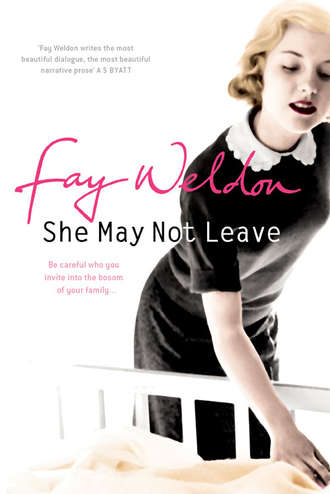
Полная версия
She May Not Leave
A Bit Iffy
‘But Hattie,’ says Martyn, ‘we have a problem here.’
‘What’s that?’ Hattie asks.
‘Just how ethical is it to ask another woman to look after one’s child? Perhaps using child-care is in itself exploitative.
I know it’s convenient but is it right?’
‘It’s always been done,’ says Hattie, allowing a hint of irritation to enter her voice. ‘Those with the best education get the most money. I use my skills to earn: she uses her human instincts to earn. There are more women like her than there are women like me, so we get them to look after our babies.’
‘But in an equitable society,’ says Martyn, ‘the scale would be reversed and we would be paid to make up for the pain of our work, not rewarded for the pleasure we take in it.’
‘It isn’t an equitable society,’ says Hattie. ‘That’s it.’
‘You are so argumentative,’ he complains. But he is pleased at the return of her spirit.
Soon she may be back to normal, and their diet will improve. But he’s not finished yet.
‘We both agree that raising a child is the most important thing anyone can do, and it should be paid concomitantly.
And a nursery is probably the best option if you don’t want to look after your own child.’
But Hattie has won, and his voice fades away and she gives him a half kiss, half nibble on his ear to show there are no hard feelings. If there is to be better food in the fridge Hattie must go out to work, and when it comes to it Martyn would rather that his child was looked after in the home than be sent to a nursery. He has not liked to ask what age Agnieszka is, nor whether she will be a pleasure to look at or otherwise. He is above such enquiry. He has a stereotyped Polish girl in his head: she is pale, thin, high-cheekboned, small-breasted, attractive but out of bounds.
Hattie has it all arranged. Agnieszka is to live in. This unknown and untested person is to have the spare room, look after the baby as a priority and do such domestic work, cooking and laundry that she can find time to do: she is to have Saturday and Sunday off and three evenings a week to go to evening class. She will be paid a generous £200 a week, with of course full board and lodging. Babs, who is accustomed to employing staff, has been consulted on these matters and this is what she recommends.
Martyn points out that Hattie will have to earn at least £300 a week to break even on the deal – perhaps more if the girl is a big eater. Hattie says she will be paid £36,000 a year and Martyn complains that that is ridiculously low: Hattie explains that instead of taking statutory maternity leave she actually handed in her notice, so certain was she that she would never want to return to work, and though she expects rapid promotion, she will formally have to start work fairly low down the end of the pay scale.
‘With any luck,’ says Martyn, ‘this Agnieszka will be anorexic. That will save money on food. But hey, if she’s what you want, go ahead. Let’s share our evenings and our lives with a stranger. So be it. Only do be sure to ask for written references.’
Martyn loves Hattie. Dissension is just part of their life. He loves brushing up against her in the kitchen; he loves the warm roundness of her body, so different from his own angularity. He loves the ease of her conversation, her ready laugh, her lack of doubt, the way she didn’t hesitate when she found she was pregnant and just sighed and said it was fate, why fight it?
Martyn comes from an awkward, belligerent family who look for slights and insults and find them, and would root out an unwanted baby without a second thought. He had no idea, when he met Hattie at a peace demo, that people could be like this, that sheer affluence of good feeling, not a superfluity of rage, could drive them on the streets in protest. It was a destined encounter. Surging crowds pushed them into each other’s arms in an alley behind Centre Point. He had an erection, and deeply embarrassed, blushed and apologised when it would have been more fitting to overlook the matter, pretend it had never happened. She said, ‘Not at all, I take it as a compliment.’
In three weeks he had moved in with her, and now they have a house and a baby. He would like to marry her but she won’t do it. She says she has no respect for the institution, as indeed neither does he, at least in principle. Both look at marriages within their immediate families and decide it is not for them. The complexity of divorce, and also its likelihood, alarms them both. But he has less objection to being owned by her, than she does by him. That worries him. He loves her more than she loves him.
‘What’s for supper?’ asks Martyn, having abandoned any hope of finding something edible in the fridge, kissing the back of her neck, melting her wrath at once.
‘I must finish the ironing first,’ says Hattie. Her mother Lallie has hardly used an iron all her life long. It can hardly be in the genes. But then Lallie’s a creative artist and Hattie is avowedly not, and so the daughter must take the normal route to a satisfactory environment, not by filling the air with music, but by providing an easy background for others.
All the same Hattie stops ironing. She needs little incentive. She bought pure cotton, wool and linen fabrics, natural fibres dyed with organic dyes, to cover the baby’s back. Now she regrets it. Unnatural fibres dry faster than natural, don’t matt, shrink or discolour with washing. They were developed for very good reason. The cot is always damp because ecologically-sound terry nappies are less effective than disposable ones. It doesn’t make much difference to the baby what fabrics it regurgitates over. But Hattie is stuck with what she committed to, if only by virtue of the cost of replacement, and she does like things to look nice. There are still some few items left to iron but when were there ever not? Martyn may feel less stressed if he eats. She is not hungry herself. She opens a can of tuna and a jar of mayonnaise and heats up some frozen peas. Martyn once, rashly, said how much he liked frozen peas.
‘Babs and I will be in adjacent offices,’ she says, as the peas come to the boil and bob about at the top of the pan. ‘And we’ll be able to share a taxi home.’
‘A taxi!’ says Martyn. ‘If we’re to afford an au pair there won’t be much taking of taxis anywhere.’
He knows tuna is nutritious and with bread and peas makes a balanced meal, but that doesn’t mean the tinned fish doesn’t clog up the mouth. The peas are not even bright green petits pois (too expensive) but large, tough and pale green. The bread is sliced brown Hovis. In his mother’s household, meals were frequent, generous and on time, no matter how paranoiac and backbiting those who sat around the table were. The bread was fresh, crusty and white. But now in his own home the very concept of ‘meals’ has been abandoned. Since Kitty’s birth he and Hattie eat to assuage hunger, and the desire seldom strikes them simultaneously. Yes, it is time she went back to work.
Demotic Credentials
‘Hattie,’ I say, ‘what I think about you going back to work or not going back to work is irrelevant. You will do what you will do, as ever.’
‘But I do like to have your permission, Great-Nan,’ she says. I know she does. It touches me but I have asked her not to call me Great-Nan. ‘Grandmother’ is best, ‘Gran’ will do, ‘Nan’ is vulgar and ‘Great-Nan’ ludicrous, but Hattie will do what she will do.
Since Kitty came along, she claims her right to set me yet more firmly in the past and advance me a generation in public disesteem. She called me Grandmother in a perfectly proper way until she met Martyn, after which she took to calling me Nan, presumably out of loyalty to her partner’s demotic origins. To possess a father who died in an electricians’ strike is a rare qualification in the political media circles in which Martyn works. Anyone who does may feel the urge to make the most of it. Grandmother or even Granny smacks of the middle class, and the young these days are desperate to be seen to belong to the workers.
But I daresay next time she sees me she will hold Kitty out to me and say, ‘Smile at Great-Nan,’ and the infant will bare its toothless gums at me, and I will smile back and be delighted. I am totally dedicated to my family, and to Hattie, and to Kitty, and even to Martyn though he is not always a bundle of laughs, but then neither is Hattie, certainly not since they had the baby.
Martyn is tall, over six foot, solidly built, sandy-haired, and hollow-cheeked but otherwise attractive enough. Girls like him. He has a First in politics and economics from Keele University, and is a member of Mensa. He tried to get Hattie to join but she declined, finding something distasteful about setting herself above others, intellectually. This may be because her mother also once belonged to Mensa, having joined in the days when you could send the qualifying questionnaire by post, so you could get your friends to supply the answers. Martyn has worn glasses since he was five. His shoulders are slightly rounded, from bending over so many computers, so many textbooks, so many reports and evaluations.
His mother Gloria, forty-three years old when Martyn was born, the youngest of five, had the same big-boned build, making twice of Martyn’s father Jack. The latter was slightly built, although like his son sandy-haired and hollow-cheeked. But Martyn looks healthy. Jack never did, certainly not by contemporary standards. Chip butties, fried fish, mushy peas and sixty cigarettes a day made sure that his arteries were clogged and his lungs black-lined. It was surprising he lasted as long as did. Gloria is still alive and in a nursing home in Tyneside. Martyn and Hattie visit her twice a year, but neither looks forward to the visits. She finds Hattie too fancy and strange-looking. The other siblings live closer to their mother, and visit more often.
Martyn is the only one who went to university. The others could have, but chose not to. They were like that: so sharp they cut themselves. Their father, Jack, joined the Communist Party as a boy in 1946, leaving when Russia invaded Hungary in 1968 to become a less extreme labour activist, but fighting as ever for the rights of the working class. He died of a heart attack when on the picket line during a strike. Waste of a good death, his friends said, better had it been from police brutality. Jack’s hair thinned and went in his thirties.
Martyn fears that the same thing will happen to him: he hates to see hairs in his comb when he gets to the mirror in the morning. The bathroom is small, and usually hung with wet, environmentally-friendly, slow-drying garments.
My own demotic credentials are rather good, these days. My husband Sebastian is in a Dutch prison serving a threeyear sentence for drug running. His name works against him. It is too posh. It attracts attention. I have suggested he calls himself Frank or Bill, but people are oddly loyal to the names that their parents gave them, as Hattie has observed to Martyn in relation to Agnieszka. Sebastian was, I believe but do not know, trying to supply the Glastonbury Festival with Ecstasy in yet another doomed attempt to solve our financial problems. These of course have become much worse as a result, but there are consolations. I have my new computer and a novel I can write in peace. I can sleep in all the bed, not a third of it; I can listen to the radio all I want, and now the panic fear, the anxiety as to how Sebastian is faring, and my own sense of social disgrace have faded, I can almost call myself happy. In other words, one can get used to anything.
And it’s surprising, even at my age, how suitors cluster round as soon as the man of the house is away. The newly divorced woman, the grass widow and the prison widow are as honey to the wasps of the passing male, in particular the best friends’ husbands. If there is no man to begin with, the attraction is not so great. Men want what other men have, not what they can have for the asking. So the lonely stay lonely, and the popular stay popular; the leap from one to the other is hard but not impossible. True widows do all right if they have come in to a great deal of life insurance. But otherwise their lot is hard: a grave too new for a headstone is disconcerting, and once it’s up it’s worse. Lose one husband, lose another. But the grass widow is in a good position, the promise of a short-term exercise in love and desire with a finite end is tempting. Age has little to do with it, in these days when a man of sixty seems old and a woman of sixty seems young. So I have suitors who do not interest me – they include a retired Professor of Philology from Nottingham, an art student who mistakenly thinks I have money and ‘likes older women’, and a television dramatist of the old school, largely unemployed, who thinks a connection with Serena would be a good idea. But like Penelope I encourage the suitors so far, and no further. I have no real intention of betraying Sebastian. I love him, in the old-fashioned, critical, but steadfast manner of my generation, we who loved first and thought afterwards. ‘Men have died from time to time, and worms have eaten them, but not for love,’ said Shakespeare, and that is true for women too today, if not for the women of my generation. We lot died for love, all right.
‘How am I really?’ I respond to Hattie’s question. ‘How I am really is angry with Sebastian.’
‘Oh, don’t be,’ she says, ‘I am sure he is suffering enough.’ ‘I am suffering too,’ I say, ‘I have suitors. But I must say I am faltering in my Penelope role. Three years is a long time.’ ‘Oh, don’t!’ she implores. ‘Just give up and behave like a grandmother and wait.’
‘He should have looked behind him,’ I say. ‘A police car followed them for forty miles and they didn’t even bother to look behind. In a car packed with illegal drugs!’
‘Perhaps he didn’t know they were in there. And he wasn’t driving.’
‘Oh, come off it,’ I say. ‘Don’t you start excusing him too.
Last time I saw him he said, “I did it for you.” That made me really cross. He committed the crime, not me.’
Hattie laughs and says it’s true, men have a knack of making their womenfolk responsible for everything that goes wrong. Martyn will open the front door and turn to her and say ‘but it’s raining’ as if it were her fault.
Sebastian is my third husband, fourth if I include Curran, so I like to think I have some knowledge of the ways of men, in the house and out of it. I regale her with tales of husbands who pat their pot bellies and smile and tell you it’s your fault because your cooking is so good, blame you for their adulteries (your fault I slept with her: you were too cold, snored too loudly, not there enough – anything). Your fault I lost my job, you did not iron my shirts. Your fault I am in prison, I did it for you. Serena’s previous husband George gave up painting pictures and in future years was of course to blame Serena for failing to dissuade him from doing so. You should never try to make a man do anything, Serena says, that he doesn’t want to. It always bounces back to you.
I love you, I love you, is the mating cry of the arriving male. All your fault, as he departs.
I met and married Sebastian when I was thirty-eight: he was forty. We had no children together: he had two by an earlier marriage: I had accumulated two along the way. I can only hope that imprisonment will not have the same effect on Sebastian as the heart attack had on George: that he will not, like George, encounter some therapist who will encourage him in the belief that it’s all the wife’s fault and the only way to survive is to leave her. To break the ties that bind. It is a fairly absurd worry. Fortunately counsellors are in short supply in Dutch prisons.
‘Codswallop,’ I say to my grand-daughter, ‘Sebastian just wanted some excitement.’ But I tell her I am only joking about the suitors, I will wait patiently for my husband’s return, and I will.
Miraculously, we have managed to keep Sebastian’s conviction from the press. He is Serena’s brother-in-law, and as such could attract attention. And though I tell her publicity is good for sales, she says she is never sure of that; the more people know about your feet of clay, the less they want to buy your books and she certainly does not want to be pitied on account of a feckless brother-in-law. At seventy-three she is still working – novels, plays, occasional journalism – if you are self-employed there is always last year’s tax to be paid.
When Sebastian went inside, Serena paid off our mortgage, so I can just about manage the bills. A small amount comes in from the gallery; in these days of conceptual art normal people still buy paintings in frames. Serena flies Club Class on a scheduled flight to Amsterdam every six weeks or so to visit Sebastian: Cranmer, her much younger husband – though at fifty-five he’s scarcely a toyboy – or some other family member goes with her. As a family we give each other what support we can. I mostly go on my own, on easyJet from Bristol airport at a quarter the cost.
I can feel Martyn in the background, thinking Hattie has been on the phone too long, chattering, and wanting her to pay more attention to him. His family don’t chatter, as Hattie’s does. I hear him putting on the radio in the background, clomping about. Well, why should he not? When the man works and earns and the woman does not, it is only meet and fitting that his interests should take precedence over hers. ‘I’d better go,’ I say. ‘Bless you for calling. I’m just fine and I think you should go back to work.’
‘Thanks for your permission, Gran,’ she says, but stays on the line. ‘Don’t worry about Sebastian; he’ll be all right. He has his art to keep him warm. I remember Great-Gran saying in the middle of the trial, just before she died, that at least prisons were comparatively draught-free. He should think himself lucky.’
Hattie’s great-grandmother Wanda had three daughters: Susan, Serena and Frances the youngest, that is to say myself. And Frances gave birth to Lallie, and Lallie gave birth to Hattie, and Hattie gave birth to Kitty. Wanda died the day Sebastian was sentenced to his three years – leaving her descendants, though distraught at her loss, at least now with time and energy to go prison visiting. I do not say she timed her death for Sebastian’s benefit, but it would not have been out of character if she had. She brought us up to be dutiful and attentive to family responsibilities at whatever cost to ourselves. Susan, our eldest sister, died of cancer in her late thirties. My mother was a stoical person, but ever since then, she complained, she felt the cold. Draughts loomed large in her later life.
Hattie has not been to visit Sebastian in prison, though she always asks after him, and writes. Well, she has been pregnant and now she has a small baby, and though of course he has not said so, Martyn would feel easier if she did not go. He has his position at the magazine to think about, and his political ambitions. He hopes to stand for Parliament at the next election, and does not want his position compromised by a step-grandfather in prison.
‘All right, darling,’ she says to Martyn. ‘I’m just coming. I think I left the car key under the nappies.’ And she says good-bye to me and is gone.
Sebastian In Prison
Sebastian is allowed two visitors once a week, if all goes smoothly at the Bijlmer prison, and so far it has. The authorities encourage him to paint. They changed his cell so that he could stand an easel up in it. They like their prisoners to be creative. They can hang his paintings on the walls of that bleak place. He is, after all, a Royal Academician. He cooks excellent curries for other prisoners in his block. No one has raped him or even sworn at him. The wardens address him as Mr Watt. Even so, the Bijlmer is a horrible, frightening, noisy, clanging, terrible place, but villains are villains only some of the time and if you are careful to be out of their way when they are in violent criminal mode, you can get by. So Sebastian tells us.
But I want him home where he’s safe, and can hear birdsong. I try not to think of him too much. He paints in oils: the house still smells of them, though the turps is drying up in the jam jars and the brushes stiffening: sometimes I catch a movement out of the corner of my eye and see what can only be his shadow through the open door of the attic. I never knew before now that the living could haunt a place. But Sebastian manages. It’s a kind of company but I would rather have the real thing. Sebastian became an RA twenty-five years ago; he had his name in the gossip columns and an exhibition at the Marlborough Gallery. He was once a member of the Arts Council, but no longer. He went on painting landscapes in frames long after everyone else had stopped. He is an idealist and a romantic. This is why he is in trouble.
Sebastian believes in the right of the artist to live in whatever state of mind they choose, natural or one that is chemically induced, drugs also being God-given. In the same way, he tells me, that women with pale lips choose to use lipstick to make them brighter. He denies the right of Government to deny choice to the individual. He is perfectly intelligent in other ways, and indeed charming, but he does not hear me when I say, in my mother Wanda’s voice, that a principle so convenient can hardly be counted as a principle, it is too laced with self-interest.
Sebastian, after the manner of men, tends to be deaf to uncomfortable truths. He believes himself to be a favourite of the God who gave him his artistic gift. His defence lawyer described him as paraphrenic – a person sane in all respects except one. His capacity for trust is pathological. He would meet up with his criminal associates in the Royal Academy restaurant, thinking that was perfect cover, though the ladies up from the provinces would look askance over their quiche and the white wine at the expensive, flashy suits and talk knowingly about ‘bling’. When he was in Holland and fingered by these friends of his, Sebastian was the only one surprised. That is my reading of the situation. He never told me the detail. He was ashamed.
A Further Ethical Discussion After Supper
‘With your Swedish background,’ says Martyn to Hattie, ‘I am surprised you take the view you do.’ He will not let up. He is no longer hungry but he is unsatisfied, and deprived of sensual pleasures. Baby Kitty still sleeps in a cot next to their bed. Martyn can see the sense of it, but wishes the baby slept in a separate room. Sometimes he wakes in the night and reaches out for his wife, which seems his natural right, and finds Hattie sitting up and feeding Kitty. (He knows she is not his wife but his partner, and thus ‘natural right’ is the more questionable: it is one of the subliminal reasons why he would marry her if he could.)
Hattie will look at the child with what Martyn hopes is adoration, but suspects it is something more like amazement. She feels uneasy about making love while dripping milk from her breasts. For someone who rather dislikes the thought of breast-feeding – so cowlike – she produces a remarkable amount of this sweetish, delicately scented liquid from her nipples. Martyn, too, is amazed. It puts him in mind of a film he saw as a child about the exploitation of workers in the Malaysian rubber plantations. Cuts were made in bark and a strange yellowish goo would seep out. He was revolted. He knows breast-feeding is natural and right but he wishes Kitty fed from a bottle. He preferred it when Hattie’s breasts were erotic signifiers rather than dedicated to feeding another, even though that other has sprung from his seed. Indeed, Martyn finds the processes of parturition so bizarre as to be almost beyond belief.
Since the birth, he, who was once so scientifically reluctant and talked about Nature in the same way as people once talked about God – as the source of all goodness – finds himself all for cloning, test tubes, stem cell research, artificial wombs, GM crops and the like. The further from Nature and the more subject to intelligence and contrivance, the better. It has crossed his mind that an au pair would take up the spare room, and that this postpones the baby having a room of its own, and makes the likelihood of any decent, noisy, bounce-around-the-house sex even more remote than before.










